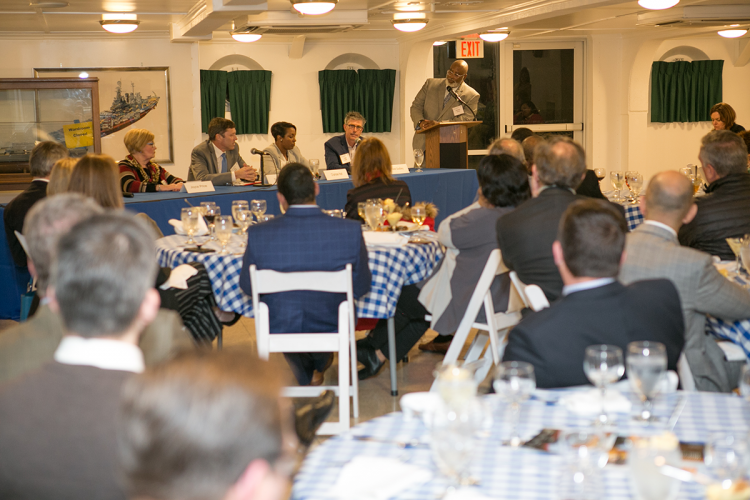Bridging Divides through Bipartisan Dialogue
Duke program uses issues that normally divide to help North Carolina leaders foster constructive policy engagement

Since 2017, the North Carolina Leadership Forum at Duke University has brought together more than 125 business, public policy and non-profit leaders from around the state in an effort to encourage constructive engagement across party lines and other perspectives. An example of Duke’s efforts to forge partnerships for the benefit of our region, the program has successfully cultivated participants’ commitment to cross-partisan dialogue and to an improved policymaking environment for North Carolina.
“The process deepened my feeling that we must consistently reach out to a much broader political audience if we want to make progress as a community.”
-- 2019 NC Leadership Forum participant
A Focus on Challenges Facing North Carolina
Initiated at Duke’s Sanford School of Public Policy and now sponsored by Provost Sally Kornbluth, the North Carolina Leadership Forum focuses on a specific public policy challenge each year. It uses facilitated conversations, led by a steering committee of diverse and experienced state leaders and Duke faculty, to build relationships, increase understanding of others’ views, and hold extended conversation around areas of agreement and disagreement.
The program convened its fourth cohort for their first meeting at Duke earlier this month; 38 participants from across the state will regularly meet in 2020 to consider how the state can respond to the opportunities and challenges of immigration.
Delivering Measurable Results
This week, the NC Leadership Forum is releasing its third report, which reflects the experience of the 2019 class, who spent the year talking about school choice. Members of the most recent class reported that the program helped them make considerable progress toward better understanding and connection with people of different perspectives.
“I am leaving with future partners in my attempts to solve some community problems. I invite anyone to talk more about it with me. I am leaving with a lot of friends.”
Other participants noted that even when disagreements weren’t bridged, they received value in better understanding opposing perspectives.
“I can appreciate the true motivation behind many people who endorse school choice for the true educational freedom as well as the deeply held convictions of those who support it despite many legitimate drawbacks,” said one participant.

NCLF’s 2019 report describes that throughout the participant’s discussion of school choice, the strongest tension emerged around the conflict between three values: a family’s right to make choices that benefit individual children, education as a collective benefit to society, and the benefit of having racially and ethnically integrated schools. While the vast majority of forum participants held all of these values, the primary issue was how strongly participants weighted them. The forum participants were particularly able to have extended, candid discussions about race in the context of education as a result of the trust that was built over multiple sessions.
Ultimately, participants agreed on some policy ideas around school assessment tools and more flexibility for all schools around funding. Many participants also found agreement around common minimum standards for teachers and leaders of all schools and a consolidated lottery process under certain conditions.
Forum members were divided around funding or oversight of charter schools or limits on parental choice. The report outlines these agreements and disagreements in more detail.
“For our democracy to succeed, policy leaders must be able to work together to debate and consider a variety of solutions to our state’s greatest challenges,” said North Carolina Leadership Forum Director Debbie Goldstein.
“Even in these politically fractious times, this program has shown it is possible to bring together a widely diverse group of policy leaders and provide them the opportunity to gain the will, skills and relationships that will enable them to constructively engage with each other in the future.”
Goldstein said the program’s sponsors, The Duke Endowment, the John William Pope Foundation, the Z. Smith Reynolds Foundation and the Hewlett Foundation, hope that the program will become a model for others seeking to foster constructive policy engagement at the state, local or national level.